I'll discuss each software solution in detail in the sections below and introduce you to other notable inventory management systems that didn't make it to my top four list.
I've compiled all of my findings in this helpful guide to help you make an informed decision while choosing an inventory management platform for your ecommerce business.
So, keep reading to learn more.
What is Ecommerce Inventory Management Software?
Ecommerce inventory management software helps businesses track and manage stock levels across multiple locations. This software optimizes stock to ensure the right products are in the right places at the appropriate times.
Most solutions include features like order management, warehouse management, and shipping features, centralizing inventory, orders, and shipments for efficient online selling. They also prevent overstocking and understocking, saving money.
Suitable for businesses of all sizes, from small stores to large enterprises like The Home Depot and Target, more complex needs may require enterprise resource planning (ERP) systems.
The Best Inventory Management Software Solutions for Your Ecommerce Business
Now that you know what to look for in an ecommerce inventory management software solution, it’s time to look at some of the best ones and see what they offer.
1. SkuVault Core by Linnworks
SkuVault Core is a cloud-based platform part of Linnworks, designed for growing retailers. It aims to simplify ecommerce operations by consolidating inventory and warehouse management.

SkuVault Core’s main function is to provide accurate inventory management in one platform.
It serves as a single source of data for all ecommerce channels. This integration helps retailers maintain accurate stock levels and avoid overselling or stockouts.
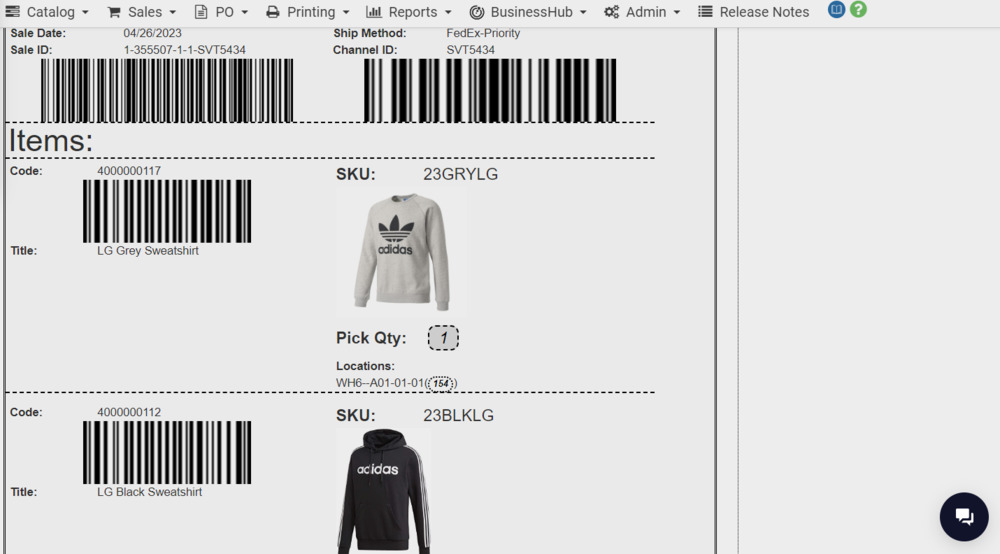
SkuVault Core emphasizes speed, simplicity, and scalability.
It's designed to reduce complexity and increase the velocity of warehouse operations. This makes the warehouse more organized and efficient.
Another great feature is SkuVault Core’s fast-track pick, pack, and ship process. This improves warehouse efficiency and reduces picking errors.

It integrates seamlessly with various ecommerce technologies. This includes platforms like Amazon Vendor, eBay, Walmart, Shopify, BigCommerce, Magento, ShipStation, Easyship, and QuickBooks Online.
This also makes it easy to track your Amazon product listings.
Key Features
- Centralized inventory management across all ecommerce channels
- Streamlined warehouse operations for speed and efficiency
- Enhanced pick, pack, and ship processes for accuracy and timeliness
- Integration with major ecommerce platforms and tools
- Easy creation and organization of SKUs and product attributes
- Automated purchase order management to reduce errors
- Quality control features to minimize shipping mistakes
- Customizable reporting for insights into inventory and warehouse operations
- Data Coach for visibility into warehouse performance and metrics
Pros
- Easy to use
- Affordable
- Faster fulfillment
- Improved marketplace rankings
- Integrations with your favorite ecommerce solutions
Cons
- Complex features may require training, presenting a learning curve for staff.
- Can be expensive for small businesses, especially when scaling up operations.
- Operational disruption is possible if there are software issues, due to dependency on technology.
Pricing
- Linnworks’ pricing is completely custom and will depend on different factors such as monthly orders, which additional modules you select, and other business requirements.
2. inFlow Inventory
inFlow Inventory is an all-in-one inventory management software solution that allows you to track everything related to your inventory in one place. Know what’s in stock, which orders are coming in, and what products you might need to order more.
And the best part?
You can keep track of your ecommerce inventory right from your smartphone and reorder items ahead of time. It also allows you to add and track your Amazon ASIN and SKU values.
inFlow Inventory is trusted by over 40,000 businesses and it comes with no additional setup fees, no contracts, and a money-back guarantee. You can also try its unlimited features free for 14 days.
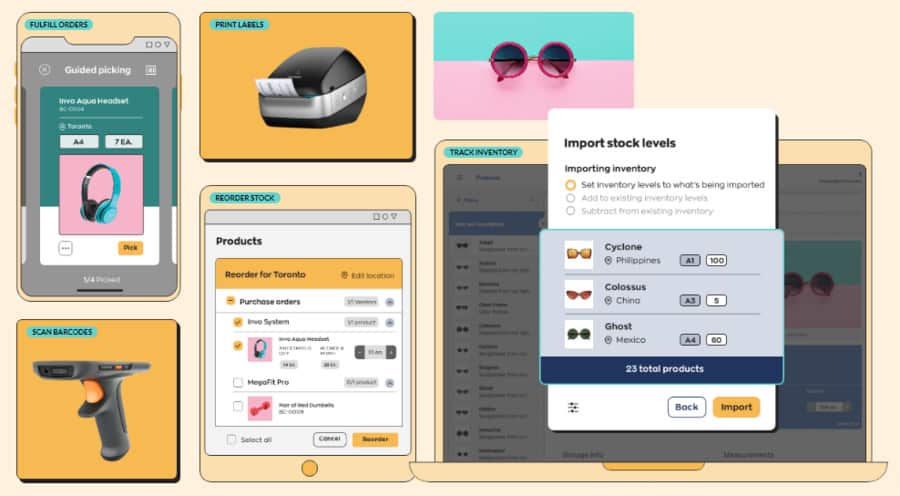
Key Features
- Order fulfillment and inventory levels update right from your smartphone
- Real-time inventory management across multiple offices or warehouses
- Organize products using features like product names and SKUs, multi-level categories, product photos, units of measurement, dimensions and weight, serial numbers, etc.
- Barcode system
- Pick, pack, and ship from one place
- A separate B2B portal for B2B ecommerce stores
- Manufacturing costs and components tracking
- Reordering by purchase order, stock transfer, work order, recommended record points, one-click PO generation, etc.
Pros
- Faster inventory management with a barcode system
- Integrate with 95+ platforms useful for your ecommerce business
- No setup fees
- Money-back guarantee
Cons
- Pricing information not available publicly
Pricing
- A 14-day free trial with unlimited features
- Contact their sales team for pricing information.
3. Zoho Inventory
Zoho Inventory is an integrated inventory management software solution designed to help businesses track inventory, manage orders, oversee warehouses, handle GST, and much more. And to top it all – you can sign up for it for free.
It’s a perfect solution for micro-, small, and medium-sized businesses to large corporations. And, it has received over 4.5-star ratings on major review websites such as Capterra, G2 Crowd, and Software Advice.
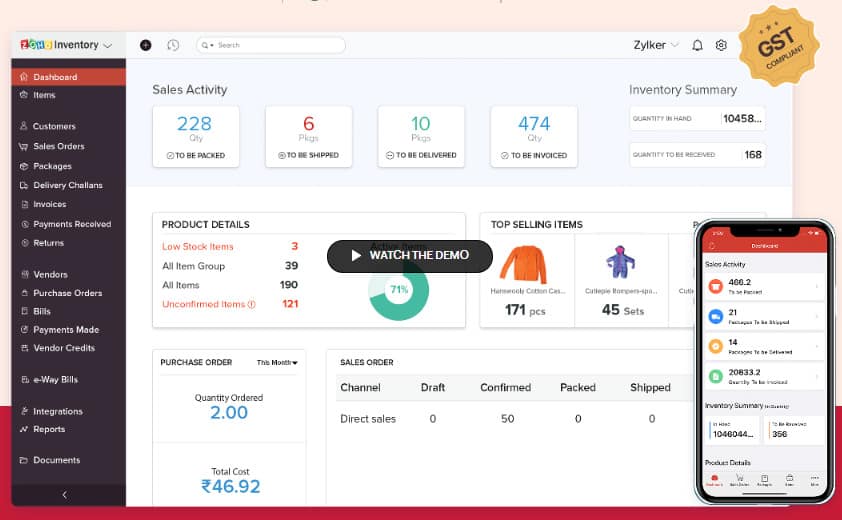
Key Features
- Inventory tracking – spare parts, expiry dates, batch tracking
- Order management
- Barcode scanning
- Multi-warehouse management
- Product grouping and bundling
- Serial and batch tracking
- Customer lifecycle management
- Vendor price lists, transactions, billing, back orders – all in one place
- SKU generator
- Reporting and analytics
- Reorder points and low stock alerts
- GST billing handling
Pros
- Live chat support
- Integrations with ecommerce solutions like Shopify, Etsy, Amazon, etc.
- Integrations with Zoho CRM and Zoho Books
Cons
- Limited features in the free plan
Pricing
- Start with a free plan for up to 50 orders/month.
- Paid plans start from $39/month and you can try the paid versions free for 14 days.
- Standard plan: $39/month
- Professional plan: $99/month
- Premium plan: $159/month
- Enterprise plan: $299/month
4. Brightpearl
Brightpearl is a cloud-based inventory management software that helps businesses keep track of their products, orders, and customers in one place. It offers features such as real-time inventory syncing, order management, customer management, and more.
The best part about Brightpearl is that it is purely designed for ecommerce, multi-channel retail, and wholesale brands. This means you can rest assured of getting real-time multi-channel inventory updates and accurate demand forecasting.
Brightpearl’s rule-based automation feature helps you save time and focus on creating growth-driven strategies.
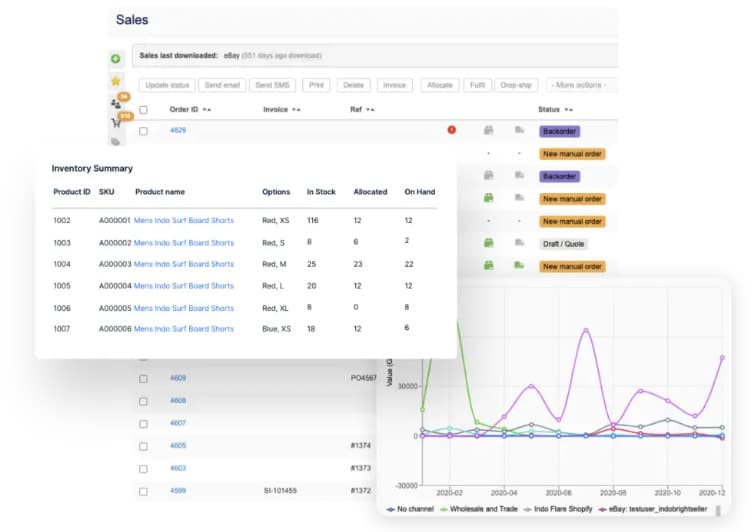
Key Features
- Inventory control
- Multi-location and multi-channel inventory tracking
- Flexible cycle counts
- Bundles and assemblies
- Custom product fields on top of categories, brands, and types
- Multiple barcodes and price lists capability
- Integrated inventory planner that offers data-driven stock replenishment recommendations
- Order management
- Purchasing
- Inventory and overstock reporting
- Automatic stock replenishment emails to your suppliers or manufacturers
- Warehouse management
- Automated order fulfillment and dropshipping
Pros
- Integrations with some of the largest multi-vendor stores like Amazon and Etsy
- Plug-and-play integrations
- Open API
- Rule-based automation engine
- Easy to use
- Simple transparent pricing
- 24/7 unlimited support
- Unlimited users at no extra cost
Cons
- No free trial or freemium version
- Some users suggested that their reporting features could be enhanced.
Pricing
- Customized prices for retail and wholesale businesses. Request a quote from their team.
5. Shopify
Shopify is one of the most popular ecommerce platforms out there, and it offers many features that can help you with inventory management.
For starters, it tracks your inventory levels, letting you know how much stock you have. With Shopify, you can manage your products, inventory, orders, payments, and shipping – all in one place.
Shopify ensures you get your products where they need to be using its multi-location management features.
And the best part?You can manage your inventory on the go – right from your mobile device. Scan, transfer, and keep exact counts of your inventory.
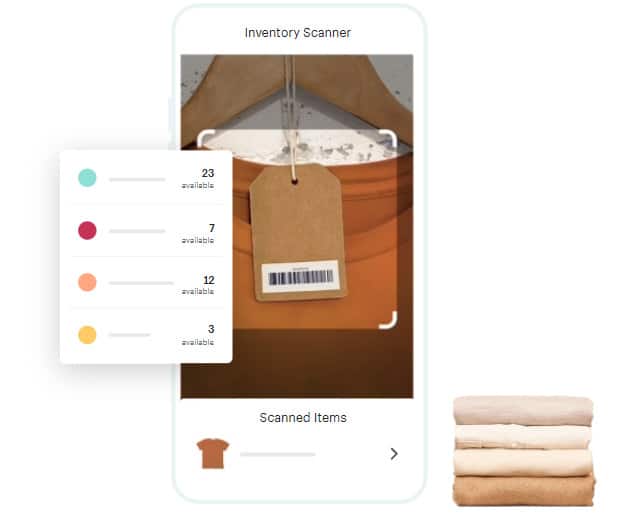
Key Features
- Inventory tracking across multiple locations and sales channels
- ABC analysis or grading system to identify products to stock, reorder, and eliminate
- Inventory transfers between locations
- Bulk inventory editor
- Order management and fulfillment
- Track lost, misplaced, or damaged inventory
- Real-time inventory updates, reports, and analysis
- Data-driven decision making
- Shopify’s own 3PL, Shopify Fulfillment Network
- Inventory management apps to add inventory capabilities such as purchase ordering, demand forecasting, and low stock alerts
- Adjustment reasons like “Damaged” or “Returned”
Pros
- Upgrade or downgrade your plan anytime
- Manage inventory on the go using the Shopify mobile app
- All-in-one ecommerce platform
Cons
- Additional transaction cost for using third-party payment providers (anything except Shopify Payments)
Pricing
- Try free for 14 days
- Basic plan: $25/month (1st month costs $1)
- Shopify plan: $65/month (1st month costs $1)
- Advanced plan: $399/month (1st month costs $1)
- Shopify Plus plan: $2000/month for high-volume businesses
You may also want to check out my comparison post of BigCommerce vs. Shopify, where I’ve covered more features of each of these ecommerce platforms.
6. Fishbowl Inventory
Fishbowl Inventory is the best warehouse and inventory management software solution for businesses using QuickBooks, Xero, or other accounting solutions.
It helps you track your products, orders, and customers by offering real-time inventory syncing, order management, customer management, barcode labeling and scanning, and more.
You can easily integrate it with your favorite ecommerce platforms such as Amazon, Magento, eBay, Shopify, Salesforce, FedEx, and more. And get all the functionality of any ERP – enterprise resource planning.
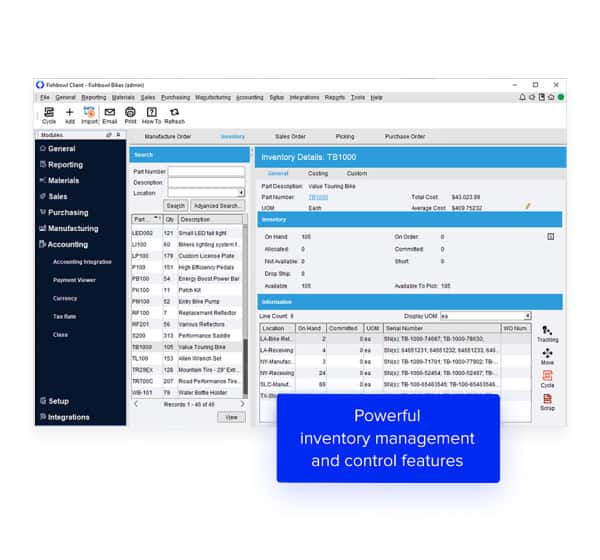
Key Features
- Inventory tracking using serial numbers, expiration dates, and more
- Barcode scanning
- Work orders
- Order management
- Automated reorder points to avoid overstocking and shortages
- Multi-location inventory tracking
- Seamless integration with QuickBooks
- Manufacturing processes control
- Pick, pack, ship
Pros
- Integrations with 12+ ecommerce platforms including eBay, Amazon, Shopify, WooCommerce, etc.
- EDI, CRM, and 3PL integrations
Cons
- Too expensive for most small and medium-sized businesses
- Limited customization options
Pricing
- Starts at $4395 (one-time, non-expiring access to the software)
- If you want to access to continuous updates to the software, you’ll need to renew it annually. Else also, you’ll still have access to your version of the platform.
Get a demo now to learn more about Fishbowl and how it can help you manage your inventory.
7. Cin7
Cin7 allows you to get products to more customers in an efficient and faster manner than you would do otherwise. It's an all-in-one solution that connects your products, stock locations, orders, warehouses, sales channels, workflows, and more into an automated solution.
That’s why thousands of businesses trust Cin7 for their inventory and order management needs.
Cin7 has the power to take your business to new heights by giving you complete control over your stock. It helps you with inventory optimization, thereby, reducing costs and increasing sales.

Key Features
- Barcode, batch, FIFO, and serial tracking
- Custom inventory management
- Automation workflows and bots
- Built-in retail POS
- Integrated warehouse management
- B2B ecommerce sales solution
- 3PL or EDI connections included
Pros
- 24/7 support
- Developer APIs
- Integrations with ecommerce platforms, accounting software, and other business solutions like Shopify Plus, Amazon, Xero, Mailchimp, QuickBooks, etc.
- Customer success manager with the higher-priced plans
Cons
- Some users said that their onboarding process could be improved.
Pricing
- Standard plan: $349/month
- Pro plan: $599/month
- Advanced plan: $999/month
- Omni plan: Contact their sales plan for pricing details.
What Are the Benefits of Using Ecommerce Inventory Management Software?
As an ecommerce business owner, accurate inventory data is critical. You need to know which products are in stock, their locations, and quantities.
A reliable ecommerce inventory management software centralizes this information, saving time and preventing stock-outs or overstocks. It can also automate reordering and sales tracking.
Benefits include:
- Improved stock control: Real-time tracking to avoid overstocking or understocking.
- Increased efficiency: Automation of inventory tasks.
- Improved customer service: Up-to-date stock information prevents customer disappointment.
- Reduced inventory costs: Accurate data reduces waste and physical counts.
- Increased sales: Accurate stock data ensures product availability, boosting sales and satisfaction.
What Are the Key Features of an Ecommerce Inventory Management Platform?
Not all ecommerce inventory management software solutions are created equal. Some offer a more comprehensive set of features than others.
When you're evaluating different software solutions, it's important to consider the features that are most important to your ecommerce business including:
- Stock management: The ability to track your stock levels in real time, set reorder points, and view historical data.
- Order management: The ability to track and manage customer orders, as well as create purchase orders for suppliers.
- Product categorization: The ability to organize your products into categories and subcategories for easy browsing.
- Product catalog: The ability to create and manage a product catalog, including product descriptions, images, and pricing information.
- Product attributes: The ability to add product attributes (such as size, color, or material) and filter products by those attributes.
- Barcoding and tagging: The ability to generate barcodes for products and scan them at the point of sale.
- Multi-channel integration: The ability to connect to multiple sales channels (such as your website, Amazon, eBay, and brick-and-mortar stores) and manage your inventory from one central platform.
- Inventory alerts: The ability to set up alerts for when stock levels are low or products are out of stock.
- Warehouse management: The ability to track inventory in multiple warehouses and locations, as well as manage warehouse staff and operations.
- Stock returns handling: The ability to track and manage stock returns from customers.
- Analytics and reporting: The ability to generate detailed reports on your inventory data, such as stock levels, sales data, and customer orders.
These are just some of the key features to look for in an ecommerce inventory management platform. The right software solution will offer all of these features and more, tailored to the specific needs of your business.
When Should You Invest in Ecommerce Inventory Management Software?
If you manage a growing ecommerce business, investing in ecommerce inventory management software is essential. This software saves time and money by streamlining inventory processes and enhancing stock visibility.
Signs you need ecommerce inventory management software:
- You need to save time: Manual processes can be time-consuming. Upgrade from the pen, paper, or basic spreadsheets to real-time inventory tracking.
- You are selling through multiple channels: Simplify inventory tracking across fulfillment centers to sell efficiently through various sales channels.
- You are facing frequent stock issues: Improve forecasting and optimize inventory levels to prevent stockouts and excess inventory issues.
- You are ordering stocks manually: Automate the ordering process to improve efficiency as your business grows.
- You lack visibility of your inventory data: Track inventory items and make informed decisions with real-time insights.
How to Find the Right Inventory Management Software Solution for Your Ecommerce Business
The ecommerce industry is booming, and with that comes increased pressure on inventory management. Ecommerce businesses need to find the right inventory management software solution to keep up with customer demand and stay ahead of the competition.
There are a few things to consider when choosing an inventory management software solution for your ecommerce business including:
- The features you need
- Your budget
- The size of your ecommerce business
- The type of products you sell
- Ease of use
You should also check if the software you pick has a dedicated support team and knowledge base to help you with any questions or issues you may have.
Be sure to consider your business needs. If you have a complex inventory setup, you'll need a more robust inventory management software solution. If you only sell a few products, a simpler solution may be all you need.
To find the right ecommerce inventory management software solution for your business, you can start by checking out the list of solutions I’ve curated after hours of research. You can also ask other ecommerce and inventory management experts for recommendations.
Once you've narrowed down your options, you can request demos or free trials of the software to see which one is the best fit for your business.
Most of the best ecommerce inventory management software solutions will offer a free trial so you can test out the features before committing to a paid plan.
Comparing the Top Ecommerce Inventory Management Software Tools
| Platform | Pricing | Multi-channel selling | Fulfillment by Amazon (FBA) | Useful Integrations |
|---|---|---|---|---|
| SkyVault Core | Starting from $329/month | Yes | Yes | Amazon, eBay, Magento, BigCommerce, Shopify, etc. |
| inFlow Inventory | A 14-day free trial with unlimited features Contact their sales team for pricing information. | Yes | Yes | Integrate with 95+ platforms, including Amazon, Shopify, WooCommerce, Xero, etc. |
| Zoho Inventory | Free plan for up to 50 orders/month Paid plans – starting from $39/month (try free for 14 days) | Yes | Yes | Shopify, Etsy, Amazon, Zoho CRM, Zoho Books, etc. |
| Brightpearl | Customized prices for retail and wholesale businesses – Request a quote from their sales team. | Yes | Yes | Shopify’s own 3PL, Mailchimp, Wave, ActiveCampaign, etc. |
| Shopify | Try free for 14 days Plans start from $25/month | Yes | Yes | Shopify’s own 3PL, Mailchimp, Wave, ActiveCampaign, etc. |
| Fishbowl Inventory | Contact their sales team for pricing information. | Yes | No | 12+ ecommerce platforms including eBay, Amazon, Shopify, WooCommerce, etc. EDI, CRM, and 3PL integrations |
| Cin7 | Starting from $349/month | Yes | Yes | Shopify Plus, Amazon, Xero, Mailchimp, QuickBooks, etc. |
FAQs
1. How often should I count my inventory?
It depends on your business, but a good rule of thumb is to count your inventory at least once a month. This will help you keep track of your inventory levels and ensure that your records are accurate.
2. How can I reduce my inventory costs?
One way to reduce your inventory costs is to optimize your stock levels. This means having enough inventory to meet customer demand, but not so much that you're overstocking your products.
Another way to reduce inventory costs is to reduce the need for physical inventory counts. You can do this using an inventory management system that lets you track your inventory levels in real time.
3. How much does inventory management software cost?
The cost of inventory management software will vary depending on the features and functionality you need. Simple stock control solutions can cost as little as $25 per month, while more comprehensive enterprise-level systems can cost hundreds or even thousands of dollars per month.
To get an idea of how much you'll need to budget for inventory management software, consider the size of your business and your inventory needs.
4. Which software is best for inventory management?
The best software solution for inventory management depends on the specific needs of your business. For example, a business operating at multiple locations might need a different solution than a business that sells products online.
However, here are some of the best platforms that many users vouch for:
– SkuVault Core
– inFlow Inventory
– Zoho Inventory
You can pick one that best fits your needs and budget.
Choose Your Ecommerce Inventory Management Software Now
Ecommerce inventory management software is essential for businesses to keep track of product inventory, customer data, sales data, and shipping data. Managing inventory can become even more complicated when selling on multiple channels.
Fortunately, various software solutions can help streamline ecommerce inventory management. I have reviewed some of the best ecommerce inventory management software solutions above.
I hope you find this article helpful. If you have any questions, feel free to post them in the comments section below. Happy selling!







Related Articles
11 Best Ecommerce Platforms to Set Up an Online Store
Top B2B Ecommerce Platforms for 2025
How to Build an Ecommerce Website in 9 Easy Steps
11 Best Ecommerce Platforms for Small Businesses in 2025
The World’s Top Ecommerce Companies (2025 List)
25 Best Ecommerce Tools to Grow Your Business in 2025